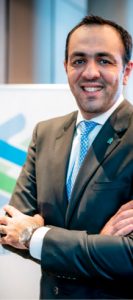Venturing into your own business can be rewarding, but the journey’s also full of challenges
BY KHIRTINI K KUMARAN
In the competitive world of business, only the fittest survive. Many have lost savings, and some had faced bankruptcy when their businesses failed.
But this did not deter four budding entrepreneurs from taking the risk by leaving their secure jobs and venturing into their own pharmacy business.
And their boldness has paid off handsomely.
Today, they are not only successfully running their own pharmacies in various parts of the country but are also thinking of expanding. Their decision to go into the pharmacy business has also been proven right as their companies have been relatively unscathed by the current pandemic.
Muhammad Farahi Arif Arifin runs seven pharmacies in Selangor, Kelantan, Terengganu and Negeri Sembilan and plans to open another three branches this year. Hani Majdina Jaffar owns two pharmacies in Pahang and Selangor, while Ramlah Yusof has two pharmacies in Pahang. Rohaya Leman, meanwhile, operates two pharmacies in Melaka.
Ramlah yearned for the freedom of time and financial independence when she worked at the Hospital Tengku Ampuan Afzan (HTAA). That finally pushed her to resign. She then joined a private retail pharmacy.
“I worked for two years and gained some experience while working in the retail pharmacy before opening my own business.”
Meanwhile, as there was no pharmacy in Masjid Tanah, Melaka. The need to provide the service pushed Rohaya to open a pharmacy.
“In 1996, I opened the first pharmacy in Masjid Tanah.”
For Arif, however, his main inspiration to venture into the pharmacy business was his dream to build his own business empire.
“To have a deep-rooted, sustainable and expanding business, we need to start somewhere, and we need to start small. I have a bachelor’s degree in pharmacy and am also a registered pharmacist. So, I decided to start with a community pharmacy.”
While working in a government hospital, Hani realised hospital pharmacies were only able to provide limited items. At the moment, there is only one private retail pharmacy.
“The people in this area needed service with more options. So, in 2016, I opened a pharmacy.”
Financing aspect important
One of the uniqueness of these pharmacies is that they cater to the predominantly Muslim communities in their areas. They can advise customers on the choice of halal medication or supplements.
The growth of such pharmacies depended very much on the availability of loans and financing from banks. Are such SME loans readily available to would-be entrepreneurs?

The Executive Director of Islamic Business and Head Products at Standard Chartered Saadiq Malaysia, Bilal Parvaiz, said: “From a banking perspective, with regards to pharmaceuticals, the halal pharmaceutical market picked up a lot of attention recently.
“The market worldwide expected to reach US$174 billion by 2025. So that shows how great the potential is in halal pharmaceuticals.
“This segment in the corporate life cycle requires the most attention. These entrepreneurs will become SMEs, and then they become contributors to the overall economic landscape.”
Bilal said Standard Chartered Saadiq offered various initiatives and programmes to support micro SMEs, SMEs and entrepreneurs in Malaysia.
“We start with financial literacy programmes. We bring them all together, and we run specific programmes on financial literacy. As an entrepreneur, the first thing is to understand the horizon of financial products and services so that you can make the right choices.
“The choices that you make today when your business is starting will have a long-lasting effect.”
Last year, despite the pandemic, Standard Chartered Saadiq conducted various workshops and financial literacy programmes, which benefitted more than 700 participants, including entrepreneurs and SMEs.
What it takes to succeed
So, what advice would these hardworking pharmacy entrepreneurs give to those mulling to open their own pharmacies?
After 25 years in the community pharmacy business, Rohaya shared that one must have enough experience, financial stability and training before opening his or her own pharmacy.
Ramlah said: “You need to have a strong interest in business and be equally passionate in providing health and wellness.”
Arif pointed out: “Once you have decided to venture into the pharmacy business, you need to work hard and not be emotionally driven when making decisions.”
He also highlighted that being creative and innovative gave an added advantage when running a business.
“Being a business owner is different from being a pharmacist. It requires a different set of skills such as management, accounting and so on,” Hani explained.
“There was also a difference in working experience in a government hospital and retail pharmacy.
“Thus, it is best to get experience beforehand and ask other pharmacies to understand better the ins and outs of running a retail pharmacy.”
To those starting their journey, Bilal said: “If entrepreneurs or companies in pharmaceutical products want to expand their business, Standard Chartered Saadiq can come in.
“We offer SME programmes ranging from all kinds of products such as cash, working capital solutions, and so on.”
The programmes, said Bilal, were not just offered from the Standard Chartered Saadiq platform but through a partnership with various parties like Syarikat Jaminan Pembiayaan Perniagaan (SJPP) and the Credit Guarantee Corporation (CGC).
“We have a full suite of digital product offerings. It means that physical boundaries or physical geographical locations do not limit us towards building our Islamic financial services anymore.
“So, any company located in any part of Malaysia can access our financial solutions.” — The Health








